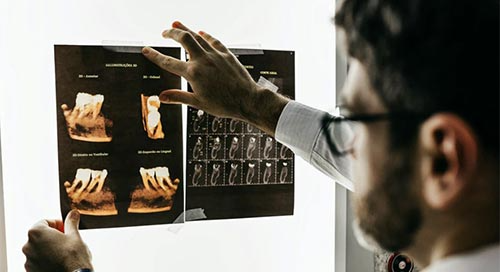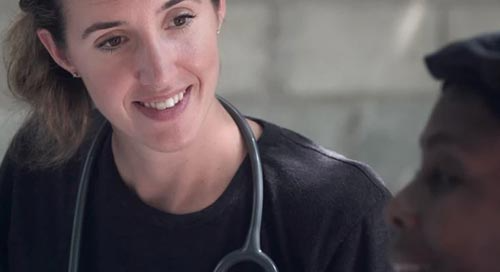interview-emerging-trends-in-healthcare
July 22, 2022

Dr. Charles Young is an experienced medical editor, publisher, and writer. He is a founding editor-in-chief of the journals Clinical Case Reports and Health Science Reports and is a practicing emergency room physician at St. Thomas Hospital in London.
Our team recently sat down with Dr. Young to hear about his views on the future of healthcare and the value of a role in scholarly communications. Read the rest of our interview.
Q: What do you see as current and emerging trends in healthcare?
Most people’s response to that would be something along the lines of artificial intelligence, neural networks, digital. And I think that’s correct. But actually, above that, is an emerging trend refocusing healthcare on patients.
What has happened is kind of a cyclical process. Healthcare tends to drift toward a systematic focus where providers become slightly introspective, thinking about how the hospital works and how the clinic works or how the information resource works – and this almost loses sight of the patient. Then everyone suddenly realizes, hang on a minute, it’s actually the patients and their relatives and the other people involved who are the most important! That swing is what I think is happening right now.
And that’s obviously a good thing! It allows us to reorient all those other components – which are still very important – to a central focus on the patient.
Q: Evidence-based medicine has been a trend in healthcare over the past several decades. As you see the focus of healthcare returning to patient centricity, what is the role of evidence-based medicine for clinicians?
When I very first qualified, evidence-based medicine was new, and it wasn’t really a big thing. Most practice decisions were made based on expert opinion. So I would do something because professor so-and-so said that’s the right thing to do. And then we went through this period of exuberant evidence-based medicine where it was almost wrong to do something that hadn’t been through a randomized controlled trial to show you that it was the right thing to do.
Then we got to a point where we realized randomized controlled trials on their own had pros and cons. But if you have a systematic review with meta-analysis, then you should definitely do that thing.
Now we’ve almost moved past that again to a point where we know systematic reviews and meta-analyses are helpful, and we know randomized controlled trials are helpful. But we also know expert opinion is still crucial, either to fill gaps or to explain how to use the information we’re getting from those research types.
Q: It sounds like the discipline has reached a point where evidence-based medicine is now one valuable tool among a number of tools that a clinician can use to guide decision-making, rather than the only tool to guide decision-making.
Yes. And a rebound like that doesn’t mean evidence-based medicine is bad or wrong. We are getting better at understanding how to use that whole concept in a more sophisticated way to make patient-focused decisions. In many respects, we’re now better at using evidence-based approaches: before, we were following it blindly, and that is not the right approach either.
And this is a whole phase that we’ve seen happening in our lifetimes! I think the next thing will be artificial intelligence and neural networks. We’re going to get into that and get really excited about it, then come back to yes, this is valuable, but it’s one tool of many.
Q: Can you talk a little more about how you think more emphasis on data might change different aspects of healthcare?
I think it will be interesting to look at how research is actually done. At the moment we’re still in this mindset that to do research you have to recruit a bunch of people and do things to them – that’s the whole principle of a randomized controlled trial. But increasingly as hospital systems become more efficient and sophisticated, I think we’ll see an ability to do research using data that’s already collected as part of routine patient care. So being able to interrogate a hospital database about outcomes for a specific group of patients who received different treatments for the same condition, doing the research on very large data sets, but without doing experiments.
I think we’ll see more reliance on existing data sets and less reliance on recruiting volunteers to do research. That would be good because it allows us to do larger-scale research. Part of the problem now is that research is very expensive and time-consuming. I don’t think research involving volunteers will ever go away, but I think there’ll be more use of data that we already have and can reuse in a more sophisticated way, not just leave it sitting in some hospital database somewhere.
Q: Do you think this type of research application would lead to better tracking of patient outcomes after treatment?
Yes; there will be a different incentive to drive the generation of a complete dataset. Instead of spending time and money recruiting people for research, it will be possible to invest that time and money into making sure patient follow-up is done properly and the right data is recorded. That’s a really important concept because it’s going to be better for patients as well – it’s in their interest that the process is done properly.
Q: This ties back to the patient-centricity you mentioned at the beginning of the interview. Can you talk more about what patient-centric healthcare would look like in practice?
Ultimately, it’s about the ability to have a grown-up conversation with patients. Where the opportunity exists to have a consultative dialogue with increased awareness and health literacy, with more information available, and also maybe a good understanding of good versus bad information. Driving that engagement is definitely a way to improve the quality of outcomes – so you get people better quicker.
Q: In the time you have been a physician, have you seen a shift in the way physicians perceive their patients’ ability to engage with conversations around their own health?
There’s definitely a positive shift in that direction. The process and general approach of healthcare professionals is moving in that direction. That’s the central theme, overall: that teamwork between clinicians, patients, their relatives, and other stakeholders is essential to get to the right outcomes.
Want to stay up to date on medical research? Explore our portfolio on Wiley Online Library or follow us on Twitter at @WileyHealth.
Is your organization interested in subscribing to Wiley titles? Learn more about our purchase models and access options for healthcare organizations.



